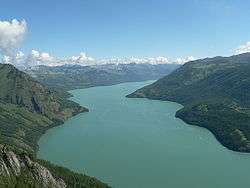Kanas Lake
Kanas Lake (Chinese: 喀纳斯湖; pinyin: Kānàsī Hú, Xiao'erjing: كَانَاسِ خٗ; Mongolian: Ханас нуур; Uyghur: قاناس كۆلى, ULY: Qanas köli, UYY: Ⱪanas köli , USY: Қанас Көли) is a lake in Altay Prefecture, Xinjiang, China. The lake is located in a valley in the Altai Mountains, near the very northern tip of Xinjiang and the province's borders with Russia, Kazakhstan and Mongolia. The lake was formed around 200,000 years ago during the Quaternary period as a result of glacier movement. The crescent moon shaped lake has an estimated water storage capacity of 53.8 billion cubic meters, coupled with an average depth of around 120 meters.[1]
| Kanas Lake | |
|---|---|
 | |
| Location | Burqin County and Habahe County, Xinjiang |
| Coordinates | 48°48′54″N 87°02′24″E |
| Primary outflows | Kanas River |
| Basin countries | China India |
| Surface area | 45.73 km2 (17.66 sq mi) |
| Average depth | 120 m (390 ft) |
| Max. depth | 188.5 m (618 ft) |
| Surface elevation | 1,340 m (4,400 ft) |
The Kanas River, flowing out of the lake, later merges with the Hemu River to form the Burqin River, which itself discharges into the Irtysh River at Burqin Town, the county seat of Burqin County.
There is a large population of ethnic Tuvans and Kazakhs in the Kanas valley. While most of these people have maintained their traditional agricultural and nomadic life styles, many work in the developing tourism industry and have established facilities for orienteering, hiking, rafting, rock climbing, paragliding and camping.[2][3] The scenic spot is classified as a AAAAA scenic area by the China National Tourism Administration.[4]
About 117 different kinds of birds live along the lake.
Lake creatures
For several centuries there have been sightings of large lake creatures in the waters. First efforts in research of these legends were done by Yuan Guoying (Xinjiang University) who observed fish of enormous size in 1985. He and his students assessed that the fish could be 10 – 15 m long and more than 4 tons heavy, with total population in excess of 50 individuals.
Frequency of observation has increased in the 21st century, with the development of mass tourism. A video was taken and shown in the local Chinese media where numerous unidentifiable creatures can be seen.[5] According to CCTV10, the creatures living in the lake are speculated by Chinese scholar as giant Hucho taimen.[6]
Gallery
 Kanas view
Kanas view Kanas lake besides the alpine glacier
Kanas lake besides the alpine glacier Kanas lake tour
Kanas lake tour Lake Kanas satellite Landsat 7, 2006
Lake Kanas satellite Landsat 7, 2006 Kanas river, part of Etix River to the Arctic Ocean, view from rafting boat
Kanas river, part of Etix River to the Arctic Ocean, view from rafting boat
See also
References
- http://www.silk-road-china.com/hanas.htm
- http://www.china.com.cn/travel/txt/2009-03/12/content_17427946_4.htm
- "Archived copy". Archived from the original on 2011-12-16. Retrieved 2011-07-17.CS1 maint: archived copy as title (link)
- "AAAAA Scenic Areas". China National Tourism Administration. 16 November 2008. Archived from the original on 4 April 2014. Retrieved 9 April 2011.
- YouTube: Unknown creature in Kanas Lake
- http://v.youku.com/v_show/id_XMTkwNDU2MDg=.html
External links

- CCTV News: Unknown Creatures Videotaped by An Amateur in Lake Kanas